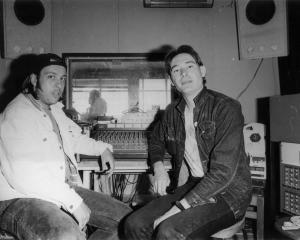
More known for her moulding of chocolate than clay, Liz Rowe has learnt the quest for perfection is not all it is cracked up to be.
Rowe, who founded Dunedin chocolate company Ocho, resigned from the company three years ago to allow it to get the expertise it needed to grow.
"It was full-on since the crowd-funding. It was extremely exciting but it created challenges going from a small company run by me to a company owned by 3500 shareholders. There was lots going on — it was an intense time."
So she had no time to think about what she going to do next except have a well-earned rest.
A couple of months later she was talking to a friend who suggested she think about going back to art school.
Doing her masters had been in the back of her mind since she completed her fine arts degree in sculpture.
"I thought it would be a good thing to do, get me back into thinking about art as I hadn’t done anything for years."
Art school was what brought her to Dunedin in 2004. She had been working in public relations in Wellington and was a hobby ceramicist when she met someone at a ceramics conference who showed her she could study art as an older student.
"It was something I always wanted to do but I was influenced by parental concerns about doing something that would lead to a job and I possibly didn’t have the confidence to go to art school then."
Her career path is a good example of not always having to stay at the thing people start off doing, she says. She started out as a journalist and also learnt Spanish — travelling to Mexico, where her interest in making chocolate was born.
"I started Ocho for a couple of days a week as a bit of income but it took over a wee bit."
So returning to art school to do her masters fits that pattern. She liked the idea of doing something with clay which she finds is like gardening.
"When you get your hands into the clay it’s soothing and distracting. It’s not mindless as it gives something for your hands to do while you are thinking about what you are getting to.
"I love glazes too."
Rowe’s idea for her master’s project was to create the perfect bowl and repeat it up to 9999 times. She researched what is considered perfect in a bowl setting up a series of protocols for the clay, size and shape, including an unscientific survey about what people considered to be the "perfect" shape for a bowl.
However, when it came to making the bowls, the clay "conspired not to be the same".

Then she came up with a coding system to keep track of the bowls and signify they are handmade using a four letter, two word phrase — such as fake news, home fire, busy body — plus a four digit number.
"Each day’s production had the same words and then an individual code."
The bowls were fired using a wood ash glaze made from the two woodburners in her home.
"Every batch of glaze I made up had a different colour to it. They’re similar but quite different."
Especially the batch glazed with ashes from the burner after her husband cremated a dead rat. It became known as the "rat ash glaze".
"People were either horrified or fascinated. The others had quite strong blues and green but those ones went quite grey. Some people didn’t want to touch them or eat off them."
She soon realised her initial plan might not be as achievable as she thought and she had no idea of what she was going to do with bowls.
"It was unfeasible to store that many bowls."
A change of approach was needed and her exchange concept was born. Initially she had thought of a road side stall with an honesty box system but then thought, "why not exchange the bowls for other things?".
"I decided to let go of the outcome and just concentrate on the process."
She worked out it took about one hour to make a bowl so thought she could exchange it for one hour of time from another person.
"They could make something for me or someone else, it could be their hourly rate of pay, it could be voluntary work, some were writing about time, short fiction, poetry."
So from February to December last year she exchanged 259 bowls in 69 exchanges.
"It became a project about time and how we value our time and it wasn’t always about productivity and efficiency."
Rowe was offered a wide range of things such as massages, haircuts, foods, baking, gardening, setting up a website, design work, art works and wood.
"Three people exchanged money but most did not think about money, it was about doing something."

"I definitely think differently about time [now]."
As a result she called the overall project "Every Minute is Precious".
People also struggled with the idea the bowl did not have a monetary value put on them.
One younger person offered $1 for a bowl which "miffed" Rowe until she thought about it.
"A factory worker in China making goods don’t get paid very much so why don’t I exchange it for $1."
Rowe says while she did not promote the exchange as she did not want people to feel compelled to take part, she did meet a lot of people through it.
For each exchange she had a conversation with the person and negotiated a contract featuring the number of bowls to be exchanged for what and with whom.
"It was really rewarding having those discussions with people."
At the end of the year she was left with 17 bowls which she will display in the exhibition alongside a booklet with writings about the exchanges .
Rowe also made some ceramic word blocks out of the two-word, four-letter phrases and used Otakou Press’ collection of letterpress type to print some of the exchanges which will also be exhibited.
Most people involved really enjoyed the "handmade" aspect of the bowls as opposed to one that could be bought from a big box store.
"It’s been a much more rewarding direction that I imagined."
It also stretched her personally as Rowe likes to have her goals well planned out.
"It was uncomfortable to let the outcomes go to just see what the outcome is. But I like this approach."
To see:
The Exchange, Liz Rowe, March 14-18, Dunedin Art School Gallery (the gallery is not open to the general public during Covid Red settings, but there will be some set viewing times. Contact roweej1@student.op.ac.nz)












